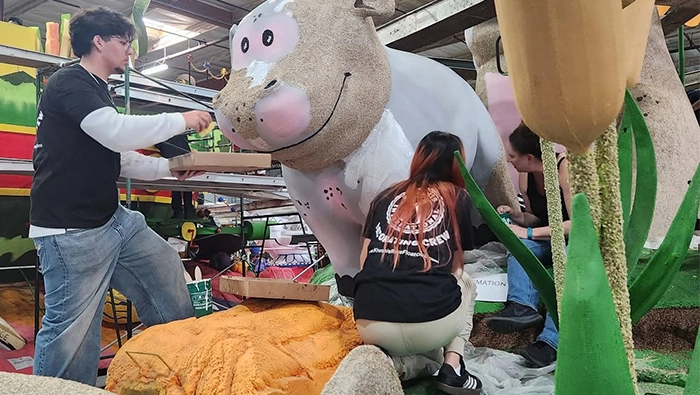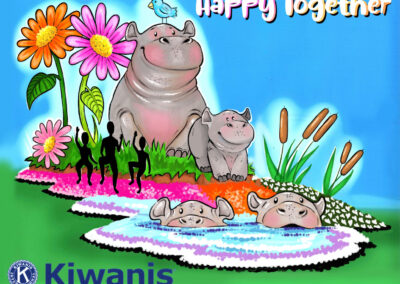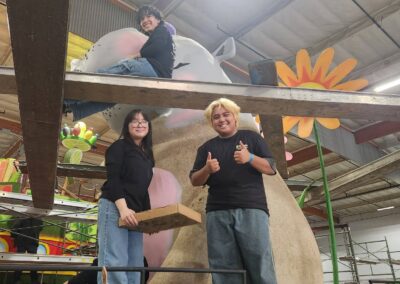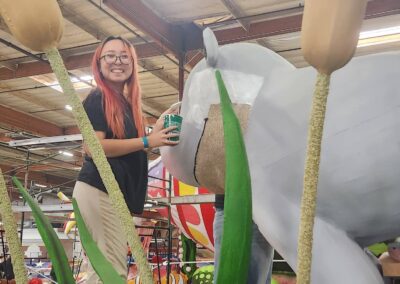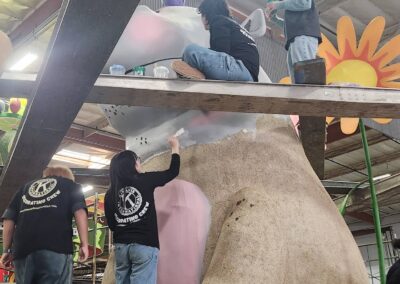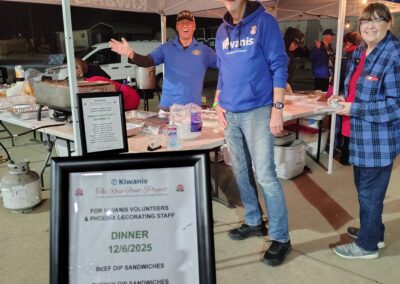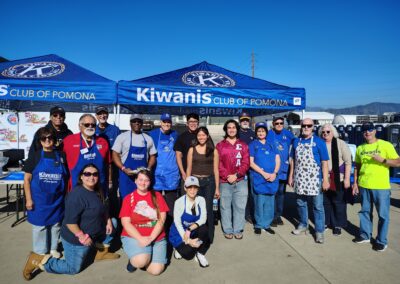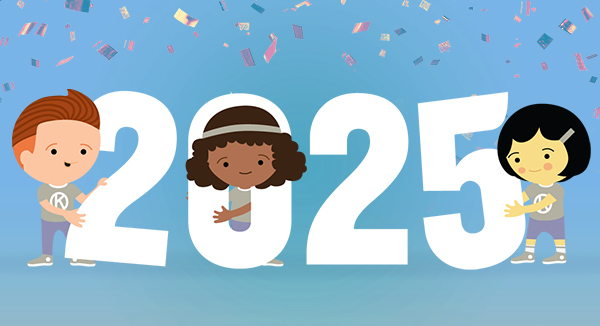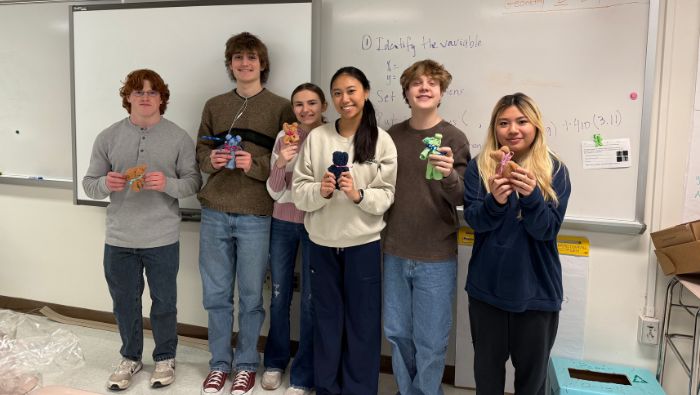
Key Club projects unite communities and Kiwanis family
The Kiwanis Children’s Fund awarded 45 Youth Opportunities Fund grants to outstanding Key Club projects in November.
By Erin Chandler
Last year, Key Club International celebrated 100 years of making a difference in schools and communities around the world. The Kiwanis Children’s Fund established the Youth Opportunities Fund so Key Club leaders can continue taking action for the next 100 years and beyond.
In November, the Children’s Fund awarded Youth Opportunities Fund grants for 45 outstanding Key Club projects that provide essential items for those in crisis, create memorable holidays for kids and families, plant gardens that serve as outdoor classrooms, and more. And many of them turn their projects into Kiwanis family affairs, involving other Key Clubs, Builders Clubs, K-Kids, Aktion Clubs and sponsoring Kiwanis clubs.
In alphabetical order by club name, the top nine projects — as determined by the Key Club International Board committee and Children’s Fund representatives — are:
“Key to Sweet Dreams” Bedtime Kits
Boyd County High School Key Club, Kentucky, U.S.
The Boyd County High School Key Club leads a project that has grown to include five other Key Clubs, two Kiwanis clubs, a Builders Club and a K-Kids club across multiple counties. Through donations and fundraising, club members assemble bedtime kits containing a set of twin-size sheets, a comforter or blanket, a mattress cover, a pillow, a stuffed animal, a book, a night-light and an alarm clock — everything a child needs to form a healthy bedtime routine. Through a partnership with Ashland Build-A-Bed, the kits are given along with bedframes and mattresses to kids who need beds of their own to sleep in. Last year, a Youth Opportunities Fund grant helped the club provide over 175 kits, and this year, they hope to give even more, along with hygiene products and essential supplies for the whole family.
WASH for Borana
Carmel High School Key Club, Indiana, U.S.
Thanks to the WASH (Water, Sanitation and Hygiene) for Borana project, members of the Carmel High School Key Club will grow as leaders and environmentalists by organizing three fundraising events to bring clean and accessible drinking water to the Borana Zone in Ethiopia. A Youth Opportunities Fund grant will go toward supplies for Walk for Wells, a symbolic walk representing how long women and children must walk for water in the Borana Zone; Art for Access, a student and community art exhibition and auction that raises awareness about water insecurity; and the Splash Summit, a multi-school youth leadership conference on service, global health and sustainability. Proceeds from the three events will be allocated by the Holistic Relief Organization.
Winter Blitz
Clackamas High School Key Club, Oregon, U.S.
Winter Blitz is a longstanding tradition (and recipient of multiple Youth Opportunities Fund grants) that calls for members of Clackamas High School Key Club and Adrienne C. Nelson High School Key Club to help those in need during the winter holidays. Each year, the two clubs organize fundraising events and donation drives to collect essential items like clothing, hygiene products, household goods, toys and even small appliances. Some of the items go into a free “storefront” at Clackamas High School, while others are delivered directly to families. Each year, Winter Blitz supports over 600 families — and each year Key Club members work to raise more funding and better tailor the event to community needs.
Children’s Christmas Project
Foxcroft Academy Key Club, Maine, U.S.
In an area that ranks highest in Maine for poverty, food insecurity and mental health issues, the Foxcroft Academy Key Club is stepping up to make sure kids still have a magical holiday season. Parents submit lists of the winter clothing items and shoes their kids need as well as some of the toys they want. Key Club members with a budget of US$210 per child are then given the chance to “play Santa” — and the local Kiwanis club makes sure every child gets a pair of boots. A Youth Opportunities Fund grant will help the club meet its goal of sponsoring 30 children and allow for the purchase of more “fun” gifts like toys and games.
Harvest Pack
Fridley Senior High School Key Club, Minnesota, U.S.
In 2025, Fridley Senior High School Key Club teamed up with classmates, its sponsoring Kiwanis club and the local Builders Club to pack 32,488 meals for people struggling with food security all over the world. This year, a Youth Opportunities Fund grant will help them attempt to pack even more meals during another Harvest Pack event. Volunteers spend all day weighing and adding healthy ingredients, packing boxes of meals and loading them into a truck that will take them to Harvest Pack for distribution.
Hygiene Kits
Lincoln East High School Key Club, Nebraska, U.S.
A past Youth Opportunities Fund grant helped the Lincoln East High School Key Club surpass its goal of assembling 500 hygiene kits for those in need in the community. This year, another grant will help them assemble over 600 kits containing shampoo, bodywash, toothpaste, a toothbrush, bandages and other essential hygiene supplies — along with a handwritten or hand-drawn card from a Key Club member or member of the St. John School Builders Club. The kits will be distributed between Matt Talbot Kitchen and Outreach, People’s City Mission and a new addition this year, the Foster Care Closet.
Pollinator Garden
Plymouth-Canton Educational Park Key Club, Michigan, U.S.
With support from a Youth Opportunities Fund grant and the Kiwanis Club of Colonial Plymouth, the Plymouth-Canton Educational Park Key Club will plant a wildflower pollinator garden on unused green space at Starkweather Academy school. Creating Habitats for Pollinators will provide seeds and supplies, while Key Club members and Starkweather Academy students will install and maintain the garden. By aiding biodiversity and conservation in the area, the pollinator garden will serve as a living outdoor classroom.
Care Bear Towels and Hygiene Packages
South River High School Key Club, Maryland, U.S.
A Youth Opportunities Fund grant will help the South River High School Key Club team up with the school’s National Organization for Women Club to create hygiene packages for Sarah’s House, a local emergency center for families experiencing homelessness. The packages will contain shampoo, toothpaste, feminine hygiene products and other essential items, as well as towels folded into the shape of teddy bears. The club plans to assemble 125 kits — enough to help every resident of Sarah’s House.
Knapp and Play Learning Center
Webster High School Key Club, South Dakota, U.S.
The whole community of Webster is coming together to support the opening of the new Knapp and Play Learning Center, a daycare and after-school program for children from infancy through fifth grade — in a building donated by a Kiwanian! For the Webster High School Key Club, which has been helping to set up the center, a Youth Opportunities Fund grant will help purchase cubbies, chalkboards, art supplies, games and books. Other supplies will be donated by local businesses and collected by Builders Club and Key Club members.
How to get involved
Does your Key Club have a project idea that could benefit from a Youth Opportunities Fund grant? Learn more about the grant and how to apply on the Key Club website. If your club does not yet sponsor a Key Club, learn about the advantages of chartering one today.

